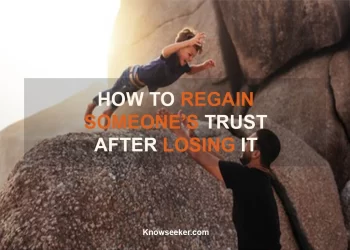
Breaking out of a toxic relationship is not as easy as many people think. People in toxic relationships, either romantic or non-romantic, can acknowledge how difficult it can be to break out of the relationship.
A toxic relationship is defined by its capacity to cause emotional, psychological, or physical abuse to one or both partners. Characteristics of a toxic relationship include manipulation, control, disrespect, dishonesty, lack of support, physical and emotional abuse, and constant conflict. The outcome is that one or both partners feel drained and mentally exhausted.
As unhealthy as being in a toxic relationship can be, it may be hard to get out of the relationship, particularly when one or both partners have invested heavily in the relationship. These investments could be related to how long they have been together, or if there are children from the relationship.[1]6 Reasons One Woman is Not Enough For a Man – Knowseeker
Statistics of Toxic Relationships
According to Gitnux.org, nearly 1 in 3 women and 1 in 4 men have experienced some form of physical violence by an intimate partner, 1 in 7 women and 1 in 18 men have been stalked by an intimate partner during their lifetime to the point when they felt very fearful or believed they would be harmed or killed.[2]Unhealthy Relationships Statistics Statistics: Market Data Report 2024
Still on physical violence in toxic relationships, an average of 24 people are being raped by an intimate partner per minute in the United States. About 72% of all victims of murder-suicides involve an intimate partner, of which 94% of the victims are female.
An online survey conducted among 75 women who were in a toxic relationship showed that 95% of the women experienced emotional harm, 71% experienced financial harm, 67% experienced professional harm, and 51% experienced sexual harm. None of the women surveyed reported to have experienced “no harm at all” in the relationship.[3]Toxic Relationships: The Experiences and Effects of Psychopathy in Romantic Relationships – PMC
Effects of Being in a Toxic Relationship
In addition to the effects of being in a toxic relationship highlighted in the previous sections, a toxic relationship can make you feel abandoned, misunderstood, or attacked. It reduces your productivity at work and raises the risk of developing any mental illness.
On average, victims of intimate partner violence, which is an apparent sign of a toxic relationship, lose a total of 8 million days of paid work each year, amounting to over $8.3 billion per year. Acts of physical or psychological abuse in a toxic relationship can affect the entirety of a victim’s life.
Other effects include:
- Depression
- Suicide
- Murder-suicide (where a partner kills the other and then takes their own life)
- Feeling of worthlessness
- Decreased interest in productivity
- Low work efficiency and output
- Anxiety
- Fear and apprehension, etc.
Signs You Are in a Toxic Relationship
People who are used to experiencing toxic behaviors from their family members may not easily identify when they are in a toxic relationship. They may think that it is normal to be treated that way. Other factors that may affect one’s ability to easily identify a toxic relationship might include having hopes that the toxic partner would change after a while.
Whatever the case, here are some key signs that you are in a toxic relationship even if you don’t recognize it.
1. You are constantly walking on eggshells
If you find yourself constantly walking on eggshells, that is, always trying very hard to be on your best behavior with your partner, you might be living in a toxic relationship. A partner who respects you should not have to make you extremely careful and scared to make a mistake.
2. You are constantly unhappy
Another obvious sign that you are in a toxic relationship is that you are constantly unhappy in the relationship. Thinking about your toxic partner gets you worked up and frustrated. You are full of regrets as to how you found yourself in a relationship like this.
This can make you feel depressed, which can in turn affect your mental health, personality, self-esteem, and productivity.
3. You feel disrespected
If your partner has a habit of constantly disrespecting you, you’re in a toxic relationship. A toxic partner may make you feel like a child or inferior in the way he/she talks or treats you. Personal assaults and devaluation of one’s personality, values, or physical appearance are classic signs of being in a toxic relationship.
Love and mutual respect are what you find in a healthy relationship.
4. You feel controlled
If your partner exhibits a controlling behavior, they may be trying to psychologically force you into a state where you cannot question their actions or behaviors. They would likely be involved in other unscrupulous behaviors behind your back.
If you feel uneasy, trying to act carefully around your partner, or if you feel that your partner always wants to know your whereabouts, that’s a sign that there is some toxicity in that relationship. A healthy relationship should allow you enough freedom to be yourself and naturally contribute to the relationship.
5. You feel exhausted
Being in a healthy relationship makes you feel more satisfied and full but a toxic relationship leaves you drained and exhausted. This exhaustion might manifest as both physical and emotional exhaustion.
You feel like your energy has been taken away from you, and this is because you are always taking insults and disrespect, always conscious of what you do, and always having to tolerate things because you don’t want the relationship to end after so much. And for all you do, what do you get in return? Abuse, disrespect, cheating, lying, etc.
6. A need to assert yourself
One of the coping mechanisms for disrespect and abuse in a toxic relationship is the need to assert yourself and prove that you are worth more than what you are going through. It’s a way of rejecting the apparent low self-esteem you might be facing, and you may find yourself being confrontational at other people, your children, or other vulnerable people.
When all these mechanisms fail, depressive symptomatology may begin to surface. In contrast, a healthy relationship gives you more self-confidence without any need to prove yourself to anyone.
Why is Leaving a Toxic Relationship so Hard?
Despite the negative effects of being in a toxic relationship, there are several reasons why leaving a toxic relationship can be incredibly hard. Let’s explore some of those reasons here.
1. Emotional attachment
Some people may find it hard to leave a toxic relationship if they still have deep feelings of love and emotional attachment to the abusive partner. This emotional attachment can make the victim have hope that the toxic partner will change one day.
2. Fear of isolation and being alone
Fear of isolation or being alone is another reason why many people find it hard to leave a toxic relationship. They fear the uncertainties of starting over again, especially if the relationship has lasted for a long time. They may also imagine if they would be able to find someone else when they leave the relationship.
Also, toxic partners often isolate the victim from his/her friends and family, making the victim feel like they have no support system. This fear of isolation, as though the toxic partner is the only person they have, can make it hard for someone to break out of a toxic relationship.
3. Manipulation and gaslighting
Toxic partners often use manipulation tactics like gaslighting to make the victim doubt their perceptions, emotions, and self-worth. The victim questions his/her perceptions as though they are overreacting or taking things out of context when the toxic partner is abusing them in the relationship.
4. Low self-esteem
Loss of self-esteem is a common effect of being in a toxic relationship. This can make the victim feel unworthy of love or incapable of finding a better partner, making it more difficult to break out of the relationship.
5. Children or shared responsibilities
The more shared responsibilities the partners have, the harder it can be to leave a toxic relationship. These shared responsibilities could include having a child or children with the person, sharing a home or other investments, etc. Children may not view the toxic partner in a negative light and might not share in the reasons why one should leave a toxic relationship.
6. Financial dependence
If a partner who is a victim of a toxic relationship is financially dependent on the toxic partner, concerns about financial stability post-separation can make leaving a toxic relationship extremely challenging. Limited financial resources can trap one in a toxic relationship even when one wants to get out of it.
7. Fear of Escalation
Fear of escalation or retaliation can make leaving a toxic relationship incredibly difficult. This is when the toxic partner issues threats, or makes you feel that they would come after you once you leave the relationship. Thus, making it difficult to take intentional steps to break out of the relationship.
8. Social Pressure or Judgment
Cultural or societal expectations can sometimes pressure people to stay in unhealthy relationships, especially if marriage, family, or religious values are involved. You fear that society may not approve of your decision to break out of the relationship even though it is costing you so much already.
9. Abuse bonding
This may also be referred to as “Trauma Bonding”, which is described as a psychological phenomenon where a person becomes emotionally attached to the abuser through cycles of abuse and reconciliation. The intermittent cycles of abuse, brief kindness and apologies, or acts of love from the toxic partner, can make it hard to leave, even when the relationship is extremely toxic.
Steps to Break Free From a Toxic Relationship
Breaking free from a toxic relationship can be extremely difficult considering the factors discussed above. However, here are some practical steps to breaking free from a toxic relationship and regaining your peace of mind and mental health.
1. Recognize that there is a problem
The first step to breaking free from a toxic relationship is recognizing that there is a problem with being in a toxic relationship. Whether society, culture, or religion, pressures you to stay in the toxic relationship, being in a toxic relationship is going to hurt you mentally, physically, psychologically, and/or productively, which is why you must recognize that there is a problem in the relationship dynamics.
2. Recognize that it’s fine to leave the relationship
Several reasons might make it challenging to leave a toxic relationship. Whether you fear its effects on yourself, your children, or how other people might respond, you need to tell yourself and believe that is it perfectly okay to leave a toxic relationship.

3. Do some psychological cleansing
This refers to a conscious effort to re-orient your mind from the lies your toxic partner has made you believe. Firstly, your self-worth is not based on what one toxic person made you believe. Read books that boost your feelings about your self-worth and self-confidence, and engage in practices like meditation, journaling, and mindfulness, that help you regain your sense of self-worth.
4. Create a financial backup
If you are financially dependent on your partner, begin making plans for financial independence. If you share a bank account with them, start by opening a separate account to begin saving money personally.
If you depend on your partner for all your financial needs, find a job that can cater to your financial needs. Explore resources like financial assistance or housing programs that can aid your transition. You can also reach out to people who can help you financially and confide in concerning the situation.
5. Make a detailed plan
Getting out of a toxic relationship also requires you to make a detailed plan. Even if you are not exactly sure what comes next, have a plan, and then a backup plan in case one fails. This entails planning where you would live if you currently live with your partner, what job you would start doing, or if you want to get a new training or go to school.
6. Talk to someone you trust
Confide with a close friend, family member, or counselor about your situation. Having someone outside the relationship to talk to can help you gain perspective and provide support.
7. Consider legal protection
If you think your partner might execute his/her threats against you after revealing your decision to leave the relationship, you can consider involving the law. Take legal steps such as obtaining a restraining order pursuing divorce or legal separation. A lawyer can also help you divide your shared properties, and determine your children’s custody.
8. Communicate your decision
When you feel like you are ready to carry out your plans to leave the relationship, request an audience with your partner, preferably in a public place because a toxic partner can get violent when you tell them you want out of the relationship.
Communicate using the “I” statements. “You” words make it look like you are pointing accusing fingers. For example, “I am not happy in this relationship,” or “I feel that this relationship is harmful to my well-being.” Be firm, calm, and composed as you communicate your decision to them.
Prepare for reactions and have an exit plan. You can call a friend to be around to help you get out if the conversation escalates or the toxic partner gets violent in the process.

9. Set boundaries
Establish clear and firm boundaries with your partner after discussing the separation. Reduce or eliminate contact with them, as that may be necessary to fully break the cycle of manipulation and emotional abuse.
If children are involved, create clearly defined boundaries and limit conversations to necessary co-parenting communications only.
10. Remain firm in your decision
When calling off the relationship with a toxic partner, remain firm in your decision, and avoid backtracking on your decision to get out of the relationship. If your toxic ex attempts to manipulate you into returning, remind yourself of the reasons you left. If possible, keep a journal of your experiences to refer back to when you feel tempted to return.
It would take some for you to heal from the relationship but prioritizing your physical, mental, and emotional health during this period, and engaging in activities can empower you and help you heal faster. This includes regular exercise, meditation, engaging in hobbies, or connecting with old passions.
11. Avoid rebound relationships
After leaving a toxic relationship, it’s essential to take time for yourself before jumping into a new relationship. Give yourself space to heal fully and rediscover your independence before considering another romantic connection.
12. Cut off contact
It is also important to cut off any potential contact you might have with your toxic ex as keeping in touch opens up a possibility for reconciliation. Assuming that you thoroughly thought about the decision before taking it, there would be no need to go back to your toxic ex.
Also, allowing uncensored contact can bring back memories of the toxic relationship, which can fuel your inner rage and might still affect your mental health. Block your ex from social media, as seeing them might rekindle memories of the toxic relationship. Limit communication to co-parenting matters if you have children together.
13. Seek the assistance of a therapist
The assistance of a qualified therapist might be required at any point in the process of breaking out of a toxic relationship. A qualified therapist can help you develop a detailed plan before you decide to leave the relationship or help you process your emotions and trauma after you leave. They can also see you through the process of rebuilding your life and improving your mental health after leaving a toxic relationship.
14. Move on with your life
When you feel confident in your progress on self-healing and have achieved good emotional recovery, be open to finding a new partner who complements you and makes you feel good about yourself. Look out for signs of toxicity in a new partner before agreeing to start a relationship with them.
Final words
Breaking off from a toxic relationship can be incredibly difficult but knowing the right steps can make it possible. It is extremely important to develop a safety net before finally leaving a toxic relationship. This includes creating a means of financial support, accommodation, emotional support, and physical/legal security.
Instead of wallowing in your mistake of entering a toxic relationship, making plans to exit the relationship can give you another opportunity to find true satisfaction in your life. If you still have specific concerns about leaving your toxic relationship, comment below. You might want to maintain anonymity if that makes you more comfortable.

















